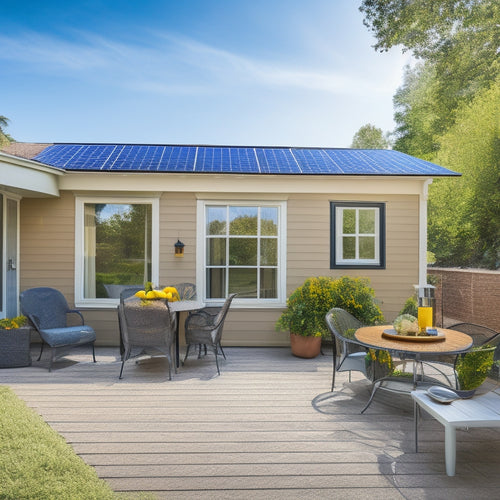
Top Solar Panel Brands for Residential Use
Share
You're likely considering top solar panel brands for your residential installation, and rightly so. Top-rated manufacturers like SunPower, Panasonic, Trina Solar, Jinko Solar, and others offer high-efficiency panels with advanced technologies that maximize energy production. These brands prioritize performance, quality, and durability, ensuring long-term reliability and savings. As you assess your options, you'll want to weigh factors like cost, energy savings potential, and brand reputation. You'll also want to examine warranty provisions, customer support, and environmental impact. As you narrow down your choices, you'll identify the perfect fit for your residential solar needs, and reveal even more benefits that come with investing in a top-tier system.
Key Takeaways
- High-efficiency solar panels with ratings over 23% are offered by top brands like SunPower, Panasonic, and Trina Solar for maximum energy production.
- The cost of a residential solar panel system varies based on system size, equipment quality, and installation company reputation, with financing options available.
- Reputable brands like Jinko Solar and others prioritize quality and durability, investing in research and development for sustainable and reliable technology.
- Brands with strong reputations, industry certifications, and comprehensive warranties, such as UL and IEEE, provide customer peace of mind and long-term satisfaction.
- Leading solar panel brands prioritize environmental sustainability, with commitments to reducing waste, using recyclable materials, and achieving carbon neutrality goals.
Top-Rated Solar Panel Manufacturers
Performance and quality are the cornerstones of a successful solar panel installation, and choosing the right manufacturer is essential to achieving your renewable energy goals.
You want a manufacturer that stays at the forefront of solar technology advancements, guaranteeing your system operates at peak efficiency. Look for companies that invest heavily in research and development, pushing the boundaries of what's possible with solar energy.
When evaluating top-rated solar panel manufacturers, you should also consider their commitment to eco-friendly materials and sustainable practices.
This not only benefits the environment but also guarantees a longer-lasting, more reliable system. Reputable manufacturers will provide transparent information about their materials and production processes, so you can make an informed decision.
Most Efficient Solar Panels Today
The most efficient solar panels on the market today boast impressive power outputs, with some models reaching efficiencies of over 23%. As you investigate the world of solar energy, it's crucial to understand the latest solar technology advancements and compare panel performances to find the best fit for your residential needs.
| Brand | Model | Efficiency |
|---|---|---|
| SunPower | X-Series Residential | 22.8% |
| Panasonic | HIT-240 | 21.8% |
| Trina Solar | Duomax M10 | 21.4% |
| Jinko Solar | Cheetah 60H | 21.2% |
| Canadian Solar | MaxPower 330 | 20.9% |
When evaluating the most efficient solar panels, you'll notice that top brands like SunPower, Panasonic, and Trina Solar dominate the market. These manufacturers have made notable progress in solar technology advancements, resulting in higher power outputs and improved efficiency. By comparing panel performances, you can make an informed decision about which brand and model will provide the most energy for your home.
Best Solar Panels for Homes
When selecting the best solar panels for your home, you'll want to contemplate top-rated efficiency and value options.
High-efficiency solar panels can maximize your energy output, while best-value options balance performance with affordability.
Top Rated Efficiency
Frequently, homeowners seeking to invest in solar panels prioritize efficiency as a top criterion. You want to maximize energy production while minimizing roof space. To achieve this, you'll need high-efficiency solar panels that can generate more power per hour of sunlight.
Top-rated efficiency solar panels typically boast high power output ratings, often above 400 watts. These panels employ advanced solar panel technologies, such as bifacial panels, half-cut cells, and multi-busbar designs, to increase energy yield.
Brands like SunPower, Panasonic, and Trina offer high-efficiency solar panels with module efficiencies ranging from 20% to 22%.
When paired with energy storage solutions, these high-efficiency solar panels can provide a reliable source of power during the night or on cloudy days.
Best Value Options
Your budget is a significant factor in determining the best solar panels for your home. While high-efficiency panels may be appealing, they often come with a hefty price tag.
Fortunately, there are affordable options that can provide long-term benefits without breaking the bank.
When searching for the best value options, consider the following key factors:
-
Price per watt: Look for panels with a lower price per watt to maximize your energy output while staying within budget.
-
Efficiency rating: While high-efficiency panels are great, mid-range efficiency panels can still provide excellent performance at a lower cost.
-
Warranty and durability: A longer warranty and durable construction can guarantee your panels continue to perform well over their lifespan.
Residential Solar Panel Costs
When considering residential solar panels, you'll want to factor in the system installation costs, which can vary depending on the size of your system, local labor costs, and installation company.
However, you'll also want to think about the energy savings potential, which can greatly offset the upfront costs over time.
System Installation Costs
System installation costs, a considerable aspect of residential solar panel investments, vary widely depending on several factors.
You'll need to take into account the size of your solar panel system, the type and quality of equipment, and the installation company you choose. These factors can greatly influence the overall cost of your solar panel system.
Here are three key factors that influence system installation costs:
-
Equipment quality and type: High-efficiency panels and premium inverters come at a higher cost, but they can provide better performance and longer warranties.
-
Installation company and process: The experience and reputation of the installation company, as well as the complexity of the installation process, can affect labor costs and overall pricing.
-
Financing options and incentives: You may be eligible for federal and state tax credits, rebates, or financing options that can reduce the upfront cost of your solar panel system.
When evaluating system installation costs, it's crucial to take these factors into account and weigh the benefits of investing in a high-quality solar panel system against the upfront cost.
Energy Savings Potential
Beyond the initial investment, one of the most notable benefits of residential solar panels lies in their energy savings potential. As you consider installing solar panels, you'll want to think about how much energy you can save in the long run.
Solar panels can considerably reduce your energy bills, and this reduction can lead to substantial long-term savings. You'll benefit from increased energy efficiency, as solar panels convert sunlight into electricity, reducing your reliance on the grid.
This means you'll be using clean, renewable energy to power your home, which not only helps the environment but also saves you money. According to the US Department of Energy, a typical residential solar panel system can save homeowners between $400 and $1,000 per year on their electricity bills.
When you invest in solar panels, you're locking in a fixed energy cost for the next 25 years or more, providing a hedge against rising electricity rates. This means you can enjoy long-term savings, predictability, and energy independence.
With the right solar panel brand and installation, you can maximize your energy savings potential and start reaping the financial benefits of going solar.
High-Quality Solar Panel Systems
High-performance solar panels are the backbone of any reliable residential solar energy system, and selecting the right brand is essential to guaranteeing ideal energy output and durability.
When investing in a solar panel system, you want to make sure that you're getting the most efficient and reliable technology available.
To achieve this, you should look for solar panel systems that incorporate state-of-the-art solar panel technologies and renewable energy innovations.
Here are three key features to look for in a high-quality solar panel system:
- High-efficiency cells: Look for solar panels with high-efficiency cells that can convert a higher percentage of sunlight into electricity.
- Durable materials: Confirm that the solar panels are built with durable materials that can withstand harsh weather conditions and last for years to come.
- Advanced inverters: Opt for solar panel systems with advanced inverters that can optimize energy output and provide real-time monitoring and maintenance alerts.
Leading Solar Panel Brands Compared
Reliability and performance are paramount when it comes to utilizing solar energy for your home. You want to guarantee that the solar panels you choose can efficiently convert sunlight into electricity while minimizing their environmental impact.
To help you make an informed decision, let's compare the leading solar panel brands.
When evaluating these brands, consider their solar technology advancements. Look for brands that have invested in research and development to improve their panel efficiency, durability, and sustainability.
For instance, some brands have introduced bifacial panels that can capture energy from both the front and back sides of the panel, increasing overall energy output.
You should also assess each brand's commitment to reducing their environmental impact. Some brands have implemented sustainable manufacturing practices, such as using recyclable materials and minimizing waste.
Others have set ambitious goals to become carbon neutral or even carbon negative.
Brand Reputation and Warranty Reviews
Three key factors contribute to a solar panel brand's reputation: customer reviews, industry certifications, and warranty provisions. When researching brands, you'll want to explore these areas to get a sense of their reliability and performance.
Customer feedback, for instance, can provide important observations into real-world experiences with a particular brand. Look for patterns in customer reviews, such as praise for durability or concerns about installation support.
In terms of industry certifications, consider the following:
- UL Certification: guarantees compliance with safety standards
- IEEE Certification: verifies performance and efficiency
- ISO Certification: assures quality management systems
Warranty provisions are also significant, as they can impact your long-term investment. Look for brands that offer extensive warranties covering both the product and performance. A strong warranty can provide peace of mind and protect your investment.
When making brand comparisons, be sure to evaluate these factors to get a complete overview of each brand's reputation. By doing so, you'll be better equipped to make an informed decision for your residential solar needs.
Frequently Asked Questions
Can I Install Solar Panels on My Roof With Asbestos Shingles?
You're enthusiastic to utilize solar power, but first, you must tackle the asbestos shingle hurdle. Don't risk asbestos safety; consider roofing alternatives before installation, ensuring a secure and efficient shift to renewable energy.
Do Solar Panels Work During a Power Outage?
During a power outage, you'll still generate electricity with solar panels, but you won't be able to use it unless you have a battery storage system or a grid-tie inverter with backup capabilities, ensuring you're prepared for power outage emergencies.
Are Solar Panels a Good Investment for Renters?
You're wondering if solar panels are a good investment for renters; unfortunately, they typically require a long-term commitment, and as a renter, you may not reap the cost savings or environmental benefits, making it a less viable option for you.
Can I Install Solar Panels on a Metal Roof?
As you weigh the benefits of utilizing the sun's power, you're wondering if your metal roof is a suitable canvas. Rest assured, you can install solar panels on a metal roof, capitalizing on its advantages like durability and ease of installation, but consider factors like roof type, age, and structural integrity.
Do Solar Panels Increase My Property Taxes?
You're wondering if solar panels will hike your property taxes. Typically, they won't, as the increased value from solar panels is often exempt from property tax assessment. Plus, solar panel incentives can offset any potential increases.
Related Posts
-

10 Tips to Buy Affordable Solar Panels Online
When purchasing affordable solar panels online, you'll want to research reputable retailers, compare prices, and chec...
-

Why Cities Need Smart Charging Infrastructure Now
You're about to experience a tidal wave of electric vehicles hitting your city's streets, and it's essential you're p...
-

Safely Staying on Course: 5 Essential Lane Tips
You're about to take your driving skills to the next level by mastering the art of staying in your lane. First, inves...


